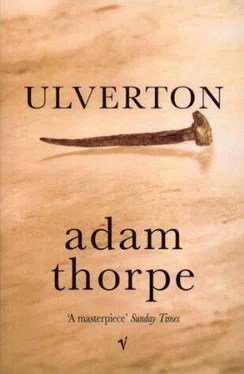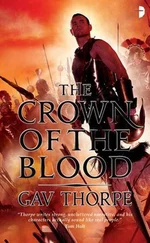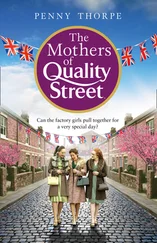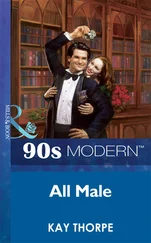There was a further silence following the snort, broken by my enquiry as to what Mr Bradman might be snorting about? He gruffly acknowledged my observation, and then squee he then leant acr he then placed uncharacteristically put his hand upon my thi left knee, leaning across to do so.
‘Violet,’ he said, ‘I think we are all lost.’
‘Come come, Mr Bradman,’ I replied, ‘we got through the last lot.’ He sla
He patted my knee in a friendly fashion and leaned back to his spot his position under the electric light-bulb. Closing his eyes, he took a great suck on his pipe, rattling the phlegm caught inside, and blew out three rings which exactly circled the electric light before breaking up against the corrugated-iron roof. of our shelter.
‘No, Violet my lovely,’ he said (that’s that particular term of endearment not being unu not being usual to him), ‘I think we are all doomed.’
It was then, at that late hour of the evening, that Mr Bradman outlined his ‘Project’, which needs no further comment here. Used as I was to eccentric employees in the past, I had never encountered anything mad and madcap or odd about Mr Bradman. — save for his hab except for our daily ‘combing’ session, merely a hangover from our evacuees period, though I haven’t found an infestation for several years, (remove?)
At first I was dismayed to find someone I regarded as an eminently sane person suffering from the ‘blues’, and that this had produced in him some curious ideas — rather as if the genius the bit of his genius that had created those painstaking illustrations of chaos and disa catastrophe had begun to take over him over. I likened it at first to a tumour, and would attempt to ‘operate’ at tea-time, trying to jolly him up in front of the gas fire in the main living room (Orchard House is one of those dwellings rarely without a chill). But after several sleepless nights in the ‘shelter’ during the worst days of the Blitz on London (Cine Reels 13A & B), I for one became quite enthusiastic about the whole thing. Little more was said, however, after the tide began to turn against Hitler and his henchm minions, and Herbert was preoccupied with what he called his ‘propaganda’ work for several local councils, and a series of delightful ‘pepping-up’ strips for troop magazines. I had all but forgotten our rather heated discussions in the fug of the Anderson on those warm September nights, until that fateful summer’s day almost eight years ago, when over my wireless came the news that the atomic bomb had been dropped onto Hir from a great height onto a Japanese city, with frightful results (Cine Reel 15A).
With the subsequent bursting of atomic bombs on land and underwater off Bikini Atoll (Cine Reel 15B), Herbert’s rather dusty Project once again became the our main topic of conversation. This was all at about the same time as British rationing (see ‘How We Live’, under ‘Diet’) spread, quite literally, to one’s daily bread — a real nuis a rather parlous state of affairs it seemed! Herbert had also just been given ‘the push’ by the editor of ‘Punch’: there is little room for a Herbert Bradman amongst the ‘jazzy’, scribbled, American-style humorous drawings that now appeal to the masses — interested only in ‘getting a kick’ out of things. Following this setback, Herbert would sit for hours on the bench in our in his garden at Ulv in sleepy little Ulverton, just gazing at the begonias, as if he had been switched off by some careless hand. It was on one of these occasions that I brought to him an envelope I had found while sorting through his drawers: it appeared, from its rattling sound, to have nothing more inside it than a lot of seeds, but was marked in an old-fashioned script, ‘First Chamber, December 9th, 1858’ — so I had not thrown it away directly. A light almost immediately spread across his face, his eyebrows shot up, and within moments he was standing upon the bench shouting unintelligibly at the top of his voice. Somewhat perturbed at this reaction, I got up and went for a glass of his favourite summer ‘quench’.
When I returned from the kitchen with a tall glass of chilled lemon barley water, I had no sooner stepped into the garden than I realised Mr Bradman had gone. It was a beautiful August day in 1946, and the smell of the harvest from the fields beyond the church was quite heady, particularly with the rather high odour of the tractor fumes (see ‘Men On the Land’, Chap. 19) wafting over the wall every now and then. I had taken to wearing sun glasses (see ‘Facial Wear’ section of ‘Vogues and Luxuries’) for health reasons, and had taken them off to go indoors, as the house is rather somb on the dark side. Putting them back on, the glare of the garden was reduced, and I was able to see Mr Bradman’s form entangled in the shrubbery behind the bench. He had, it seemed, tumbled in his excitement into my newly-planted dwarf conifers, breaking not a few of the prize azaleas etc. on the way. On crossing the lawn as quickly as a full glass of lemon barley water allows one to, I was relieved to find him un not quite to discover him undeterred, muttering to himself with what I thought was a serious gash on his cheek, but turned out to be a crimson petal off my lobelia! He wouldn’t be budged, and my attempts at pulling him out ended in ignominious failure, with lemon barley water sticking down my front and my straw sun-hat rather the worse for wear beside him. and myself on my bottom, on my behind
Seeing that he had not actually harmed himself, and that my struggles were useless, I set about repairing some of the damage with secateurs (see ‘Men on the Land’, Appendix) and pea-sticks as best I could. During this operation, I could quite clearly hear Herbert discussing with himself his grandiose plans, for the envelope contained seeds extracted from a Pharaoh’s tomb, and ‘the symbolic parallel was not lost on me’ (as he later put it). Even now, when I water that shrubbery (we no longer emply a full-time gardener, of course), I think of its verdant nest as being the real birth-place of the ‘Project’ and all our subsequent effrt over the last six years.
I do hope that you forgive the vagaries of the rather ancient typewriter (see ‘Mechanical Inventions’) with which I am proceeding: the ribbon has a tendency to slip down which explains the red bits now and again! while the ‘o’ key has now decided to stick every so often — most trying! One is, I reflect, so dependent on mechanical devices or ‘gadgets’ these days: when one considers how complicated a typewriter is, let alone a modern passenger aircraft of some thousands of horse-power and enormous tonnage, the miracle is that we are not all deluged in wires and steel frm one day to the next. If my ‘o’ key were to stick completely — as the dusty ‘z’ appears to have done — I would have to resort to a fountain pen. This would break Mr Bradman’s cardinal rule of absolute clarity and the need for an ‘objectivity’ or ‘purity’ in presentation. This is not at all the same thing as his belief in ‘the vital’, or as he puts it or what he terms ‘the fiery essence of concentrated personal being’, which is why samples of handwriting and voices recorded on a magnetic tape recording machine have been included — as well, of course, as the ‘Collected Works’ of Mr Bradman himself. These (as you will see) include several pen-and-ink riginals from the Twenties, and a chalk drawing which was the basis for his ‘Bournville’ illustration of 1940. This rather splendid work was to be displayed on giant hoardings outside Birmingham and Coventry Central Stations, but the wood-pulp crisis (stemming from the German invasion of Norway in that year, see Cine Reel 11F) forced the Bournville Company to ‘hold back’ for the common good. The original painting was (alas!) destroyed in the bombing of Coventry on the night of the 14th November, 1940 — a blow which caused Herbert to lose his taste for large-scale, highly prestigious commissins.
Читать дальше










